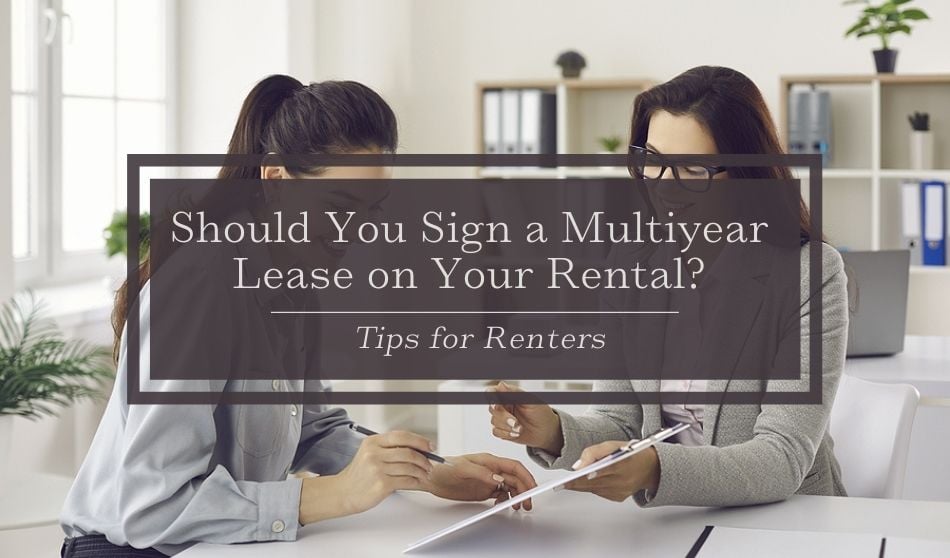Finding the best place to live for your needs comes with a lot of choices: renting vs. owning a home, and if you decide to rent, you have to choose how long you want to live in that home. Committing yourself to a multiyear lease can have its pros and cons. Here are some things to consider before you sign on the dotted line.
Cons to Signing a Multiyear Lease
Multiyear leases can have their perks. From stable housing to unexpected discounts, there are a few reasons that a long-term lease agreement can be beneficial, but it is not without its disadvantages. Any lease agreement locks a renter into a predetermined lease term; this can mean limited flexibility should the need arise.
If you decide that your landlord-tenant relationship is no longer beneficial, it can be significantly harder to wait out the lease term when that means waiting years instead of months. A bad landlord or an exciting job opportunity in a new town can both make a multiyear lease feel like a limiting option.
Since breaking your lease can be very costly, and not all landlords or property managers allow renters to sublet a rental, it is important to be very sure that you would like to continue to live in the same place and rent from the same person or team for multiple years.
Learn more about breaking your lease: How to Break Your Lease Early (Without Breaking the Bank)
Pros to Signing a Multiyear Lease
While the downsides to a multiyear lease could be costly if they are not considered, there are some significant reasons that a multiyear lease can be beneficial for responsible renters. If you know you don’t plan to make any life changes in the next few years, a multiyear lease can be an excellent option.
Fixed Expenses:
The base of a successful budget is ensuring that you have accounted for all of your expenses accordingly. Unfortunately, yearly tax increases, higher utility fees, and general inflation can cause property owners to feel the need to raise rental rates annually to compensate for rising costs. This means renters with a month-to-month or an annual lease agreement are likely to see a rent increase each year.
Renters with a multiyear lease agreement get the benefit of accurate financial forecasting. Regardless of the economy, inflation, or other factors, you have the guarantee that your rent won’t increase during the length of your lease.
Less Stress:
Moving is incredibly stressful for anyone. Beyond just the expenses and stress associated with packing materials, hiring movers, and physically moving, there are the additional costs that come with actually finding your next place. From time spent touring apartments and contacting listing agents, to the cash required to pay for application fees and security deposits, there is a lot more involved than you may initially think. While these costs can start to feel unavoidable, if you can avoid moving each year, the savings can add up quickly.
Rent Discounts or Other Perks:
Rent concessions in the form of discounts or free amenities are common tools landlords and property managers use to advertise their listings. However, these rent discounts and perks don’t have to be limited to a marketing tool. Many landlords or managers will offer these to renters who agree to sign a multiyear agreement.
Tenant turnover is costly; it requires landlords to clean the rental after a tenant moves, advertise the listing, screen applicants, and select a new tenant. This process is time-consuming and no matter what screening techniques they use, they always risk ending up with a bad renter who damages the property or constantly pays rent late. If you have shown that you’re a responsible renter, you may be able to negotiate a long lease term with discounted rent or other perks like a free parking space or storage unit. This is especially effective when you have already rented from this landlord before and have proven to be a good tenant.
When is Asking for a Multiyear Lease a Good Idea?
Finding suitable housing with a trustworthy landlord or management company can be tough; especially in a hot market. While renters can avoid starting the search over each year by entering into a multiyear lease, you need to seriously consider whether you would appreciate renting from this landlord or management company for multiple years. Since there are bad landlords and bad renters alike, a multiyear lease can be extra beneficial for renters who are facing a renewal period. Landlords hate the headache of irresponsible tenants, and no renter wants to deal with a bad landlord. If you and your landlord have a good relationship, it’s the perfect time to suggest a longer lease term. It is a win-win for everyone involved since both parties know what to expect. If your lease is up for renewal and you decide you would like to stay for multiple years, this can be an excellent negotiating tool.






